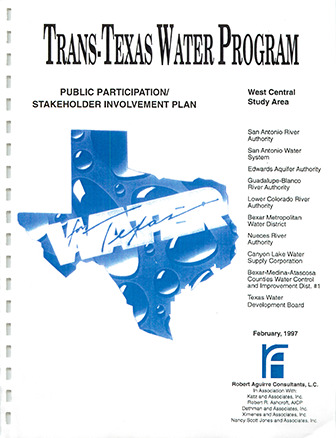Trans-Texas Water Program West Central Study Area Public Participation / Stakeholder Involvement Plan

| Author | Robert Aguirre Consultants, LC, Katz and Associates, Inc, Robert R Ashcroft, AICP, Dethman and Associates, Inc, and Nancy Scott Jones and Associates, Inc / San Antonio River Authority, San Antonio Water System /EAA / Guadalupe-Blanco River Authority / Lower Colorodo River Authority / Bexar Metropolitan Water District / Nueces River Authority /Canyon Lake Water Supply Corp / Bexar-Medina-Atascosa Counties Water Control and Improvement Dist #1 / Texas Water Development Board |
| Year | 1997 |
| Description | Note: This report is included because of its possible historical value. It has been replaced by more recent plans. Plan for involving the public and stakeholders in the planning process for the Trans-Texas Water Program West Central Study Area |
| Publisher | Robert Aguirre Consultants, LC |
| Location | West Central Texas |
| Cover | View Download |
| File | View Download |
| Summary |
|
Note: This report is included because of its possible historical value. It has been replaced by more recent plans. The purpose of this document is to submit to the Policy Management Committee (PMC a recommendation for a design and implementation of the public participation / stakeholder involvement plan. This recommendation is the result of the first phase of analysis and data gathering and is designed to capitalize on what has been teamed from and about the public, stakeholders, and sponsoring agencies. The public participation plan recommended here is a comprehensive approach designed to work in partnership with each of the sponsor agencies, the advisory committees, the technical contractor, and the public. The goal of the public participation plan is to work within this partnership providing input to the PMC in the fulfillment of their mission, which is: To develop a “menu” of regional water resource planning strategies which are both technically feasible and publicly acceptable, and which meets the future water needs of the entire 32 county study region. It is recognized that public participation and input is an integral part of the Trans-Texas Water Program effort and that the conclusion of the program, as mentioned above, is a “menu” of strategies from which the regional participants would be encouraged to select strategies which best meet their individual local needs…. The design of the public participation plan is based upon input from the public, stakeholders, and water agencies (including the sponsor agencies) which was gathered in phase one. A large quantity of information has been assembled and analyzed, resulting in the following key findings used in the plan design: • Residents chose having a reliable supply as the highest priority, followed closely by water quality and more distantly by keeping the cost of water low. • One-third of the region’s residents are not concemed about future water shortages. • Conservation is most often mentioned as the single most important thing to do to ensure water for the future, and is the most well known and supported water management strategy. • Except for conservation, citizens are generally not familiar with other water supply options. • One-third of the residents do not feel they are informed on water issues. • Residents want to be kept informed on water issues. • When seeking reliable information on water issues, three-fourths of the residents turn to either their local water/utility department, city or county government, water districts or authority. • Residents most frequently state they trust elected local/state officials and local water officials to make decisions about meeting future water needs, however one-third either trust nobody or do not know who to trust…. The recommended plan is designed to address the issues as well as the opportunities which exist throughout the study region within the framework set forth above[:] • Three-quarters of residents in the study region strongly agree that elected and water utility officials should involve the public in water planning issues…. • Integrated Resource Planning Workshop (Task 4-1) • Elected and Water Officials Briefings/Updates (Task 4.2) • Implementation of Media Plan (Task 4-3) • Assist in Development of Phase 2 Technical Scope of Work (Task 4-4) • Define and Implement IRP Organizational Requirements with Sponsor Agencies (Task 4-5) • Identify Planning Policy Objectives With Each Sponsor Agency (Task 4-6) • Re-Structure of Advisory Committees (Task 4-7) • Advisory Committee Meetings (Task 4-8) • Informational Materials Development and Production (Task 4-9) • Materials Distribution (Task 4-10) • Develop Public Information and Involvement Opportunities Through Outreach Efforts (Task 4-11 ) • Refine and Expand the Public’s Evaluation Criteria (Task 4-12) • Advisory Committee’s Interim IRP Report (Task 4-13) • Coordinate With Technical Contractor to Evaluate Resource Options (Task 4-14 • Assist in Characterizing Resource Options (Task 4-15) • Identify and Define Future Uncertainties and Potential Outcomes (Task 4-16) • Selection of Water Resource Scenarios (Task 4-17) • Advisory Committee’s Final IRP Report (Task 4-18) |
Search for Documents
Advance Search
Explore EAA's Scientific Reports
- All Reports
- Remote Sensing
- Precipitation
- Overview Studies
- Modeling
- Hydrology and Hydrogeology
- History
- Groundwater Recharge, Recharge Zone
- Groundwater Movement
- Geomorphology and Caves
- Weather Modification
- Geology
- Water Use and Conservation
- Geochemistry
- Water Resources Planning and Management
- Floods and Drought
- Water Quality
- Climatology
- Surface Water / Groundwater Relationship
- Biology
- Springs, Groundwater Discharge
- Archaeology
- RZ Protection
- Aquifer Levels
